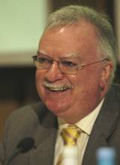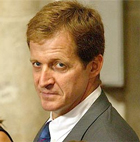They speak no evil of him

Several of Bertie's senior colleagues agreed to be interviewed for this profile. But all of them demanded absolute anonymity. Most spoke of their party leader in highly complimentary terms. On several occasions I wondered why they would not want their boss to know the sheer depth and breath of the esteem in which they held him.
That wasn't it, they responded. They feared that some other, less effusive, quotes might get attributed to them. And if it was known that they had spoken at all, there could be serious repercussions in this sensitive time in the run up to a general election. In any case, most protested that they barely knew him. That beyond the mundane day-to-day cut-and-thrust of the political arena, the man was basically a mystery to them.
A Fianna Fáil veteran
“He's extraordinarily shrewd. His detractors would call that deviousness. But to some extent everybody in political life is shrewd. He'll have about 40 plots going on and not one of us would know. He'd have five or six irons in the fire. You would go off thinking ‘I've been sent off to sort this out. I'm very important.' And then you'd find there were five or six guys on the case from different angles.
“He's able to take tough decisions when he really has to. When it's five to midnight. He'll take it. He won't take it at a quarter to midnight. He'll take it at five to. Because he knows he has to go out that door in five minutes. When he's down to the wire he does take the hard decisions.
“What he will do then is ring the shaftees within a half hour and there will be coffee flowing and he'll be going ‘sur I had to do it... you know yourself... but here's a project you could handle...' So he does what he has to do but he goes around with the mopping cloth very fast.
“Listen. He's an impossible man to dislike. He's extremely shrewd politically. That is the bottom line. I've had my days with him and had reason to dislike him. But how can you dislike a guy who insists on talking to you every day and asks you how're you getting on and eventually you say ‘I'm not talking to you for some reasons that I've forgotten.' He doesn't do grudges.
“He's so long doing this. We all know he's the best shot we have. Whatever the issues are he's our best shot. The public know all his foibles and they still like him. They know he's got a tough job and if you have to be shrewd or even devious then you have to be shrewd or even devious. The punter knows that.
“He is our best bet. Even his biggest detractors will tell you going into a general election he's the best shot we have. Even backbenchers who mightn't fancy him too much will say he's the best bet we have.
“If you want the downside of the guy he is very devious and the right hand doesn't know what the left hand is doing. All that stuff is there and everyone knows it. The whole country knows that and everyone who deals with him knows that. But you kind of learn to live with that because he makes it work for all of us. And for the country as well in a way.”
 Stephen King (adviser to former UUP leader David Trimble during the early peace process negotiations)
Stephen King (adviser to former UUP leader David Trimble during the early peace process negotiations)
“There was a private, secret meeting with the Ulster Unionist leadership at the border in 1996 and 1997. We had had one of these meetings (years earlier) with Albert Reynolds in Dublin. He blabbed about it and that really sours things. Ahern kept them watertight. That really developed the trust with Trimble.
“Ironically he [Trimble] quickly developed a better relationship with Bertie than he had had with John Bruton – even though Bruton was more on our wavelength.”
Former civil servant:
“He won't take a decision until the very last minute. Particularly if that decision is going to upset somebody. The media call it dithering but as a tactic it has served him well. You let people dangling. And nine out of 10 times you can get out of it without a row.”
A colleague:
“He hates to make enemies. And he'll go a million miles to reduce a wound somewhere. He really does. Talk about prodigal son stuff. He'd have a houseful of prodigal sons if he was left to himself. He goes out on the wing and pulls back people who are hurt. He's very good at that. It's not put on. It's in his make-up. He doesn't like to fall out with people. He tries not to.”
Another colleague:
“Maybe not revealing himself is to do with keeping your options open. I suspect that's the real agenda. If you talk to 20 people you have to be careful what you tell 19 of them so they don't all talk together and you have a mess on your hands. He dances over a lot of the stuff until he finds out where the whole thing is moving.”
 Joe O'Toole (currently a Senator, former head of INTO):
Joe O'Toole (currently a Senator, former head of INTO):
“He has a way of dealing with all industrial-relations issues. He allows the issue to ripen beyond the time when everyone agrees that something has to be done. Then he gets the parties to bang heads. At the last minute he sees what's between them and he offers a compromise that will save face on both sides. Watching him in a lot of deals over 30 years, he always kept his word. But while he certainly has been a straight dealer, there are corners there too”
Another former colleague
“Say if you had an Aer Lingus strike – he'd have a line into someone manning the security gate and he'd have a line into the boardroom. That's how he worked all the angles. He wears everyone down. He will stay up later. Talk longer. Listen longer. Until he's the last man standing.”
Alastair Campbell, Tony Blair's former communications guru
 “A top bloke, a very clever guy. I found Bertie so easy to get on with. It was impossible to fall out with him. It was so clear from the word go that Tony and Bertie were on the same page. Bertie is a bit more understated than Tony in terms of demeanor and rhetoric. But I think that was what made them a good double-act in dealing with all the ups and downs of those negotiations. Tony's drive and zeal and determination to make sure it happened. Bertie had the same drive to get the result but he was much more understated about it. Although he can have a flash of temper – which is all the more effective for being so rare.
“A top bloke, a very clever guy. I found Bertie so easy to get on with. It was impossible to fall out with him. It was so clear from the word go that Tony and Bertie were on the same page. Bertie is a bit more understated than Tony in terms of demeanor and rhetoric. But I think that was what made them a good double-act in dealing with all the ups and downs of those negotiations. Tony's drive and zeal and determination to make sure it happened. Bertie had the same drive to get the result but he was much more understated about it. Although he can have a flash of temper – which is all the more effective for being so rare.
“For several periods his role seems to be to just sit there and take lots and lots of criticism from whoever was upset with the way things were going and he would just sit there and soak it up. But I can remember a situation when Adams and McGuinness had been really pressing for something and Bertie had been trying to work with them. Then they moved the goal posts and, well, he had a way of speaking when you knew he was not going to be pushed any further.
“During a lot of those all-night sessions when nothing much is happening, you get to spend a lot more time talking. He and I used to talk about football all the time. He's good at talking about people too.
“When I resigned in 2003, one of the nicest letters I got was from Bertie. I've always found him really easy to talk to. When I'm asked at talks now which politicians did I like best – it's a toss up between Clinton and Bertie. The human bit is strong. You're never far away from seeing a very human politician.
“In the end he is a politician. If you're in power and you want to stay in power part of your mind had to be calculating at all times. But when Bertie looks in his shaving mirror in the morning, I don't think he's ever lost sight of why he's there.”
Cabinet colleague:
“He's a classic chairman. He's not a chief. He chairs the country. He does it extraordinarily well. He wouldn't be a chief in the classic chief in the Dev mode. He doesn't do Martin Luther King stuff. He doesn't drive forcefully on towards the vision and try to convince all sides that's where we have to be. He would have a broad set of goals that he wants to get to. He knows where he wants to get to on Northern Ireland. He knows where he wants to get to on the economy. He knows where he wants to get to on his famous socialism. He knows where he wants to get to on most things. But he doesn't get hung up on the pace of getting there. Or on the methodology.
“He likes to keep his options open so he doesn't burn his bridges or go down cul-de-sacs. He likes to keep open roads. If ever there was someone to epitomise the word ‘political' it has to be him. Since they wrote the Prince, it has always meant getting yourself, the country, your mission and your project, getting all those things to where you want to get them. And he keeps his eye on where he wants to get to. And doesn't shut down options. He shifts things until they get there. And it does work. Because very often then you are the only one left standing.”
Maurice Ahern (Bertie's older brother and Dublin City Councillor)
“Nobody ever falls out with Bertie because he never says anything that would give them reason to. He's good with everyone because he says nothing that could come back to bite him.
(Maurice described how he had been out with his brother on a canvass the previous week and how Bertie looked over his shoulder to be sure that no-one was listening before literally whispering what he had to say to him into his ear.) “I never ask Bertie anything over the phone because I know he won't ever say anything over the phone. He would say it right in my ear – that's how Bertie tells you things.
“He keeps a lot to himself. Whatever he thinks – he never says anything. He would never speak ill of people – even in private. If he doesn't like someone he would never say it. Nobody would know.
“I remember when Bertie would come home for his lunch before he was married. My mother would be going mad about Garrett [Fitzgerald] and Bertie would be saying ‘ah sure he has to say that – he's in opposition.' Bertie was always like that.”
